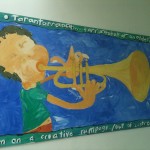Lewis Holloway, the superintendent of schools in Statesboro, Ga., imposed a new policy this fall prohibiting private electronic communications after learning that Facebook and text messages had helped fuel a relationship between an eighth grade English teacher and her 14-year-old male pupil. The teacher was arrested this summer on charges of aggravated child molestation and statutory rape, and remains in jail awaiting trial.
“It can start out innocent and get more and more in depth quickly,” said Mr. Holloway, a school administrator for 38 years. “Our students are vulnerable through new means, and we’ve got to find new ways to protect them.”
Social media doesn’t “make it easier” for teachers to form “boundary-crossing relationships with students.” It makes COMMUNICATION easier, period. If teachers have poor judgment about communicating appropriately, that’s a different story.
Likewise, “Facebook and text messages” did NOT “help fuel a relationship between an eighth grade English teacher and her 14-year-old male pupil.” Poor judgment and inappropriate conduct did that!
Let’s be clear about what’s to blame and who is responsible. The communication medium is not the enemy. There were teachers doing inappropriate things long before the Internet. Did we ban letter-writing? And if we had done that, would that have solved the REAL problem — that of obvious teacher misconduct and violations of trust, relationships, safety?
Teachers who communicate and behave inappropriately should be treated with appropriate consequences — sometimes yes, those are criminal. What are those “appropriate consequences,” you ask? Well, I’d say it depends on the professional code of conduct which governs the teaching body in the state/province/country where one is a teacher.
And how many states/provinces/countries have those, hm?
(Not too many, last I checked.)
We have them for doctors, lawyers, even engineers. But not teachers. Let’s raise the standards and values of the teaching profession, and see what happens. To everything. But banning electronic communication is the wrong place to start that journey.
“The fact is, the radio frequencies that are assigned for aviation use are separate from commercial use,” Mr. Altschul said. “Plus, the wiring and instruments for aircraft are shielded to protect them from interference from commercial wireless devices.”
Mr. Dorr reluctantly agreed. “There have never been any reported accidents from these kinds of devices on planes,” he said.
Uh, don’t people get it? Of COURSE it has nothing to do with the interference of frequencies. This is just a guess — but here is my logic of thought:
1- The majority of mechanical or other problems that arise during a flight happen during take-off and landing — btw, I have no stats on this, so please prove me wrong — this is based purely on my own observation of news items involving plane crashes/accidents in my 36 years as a human being.
2 – Thus, it’s kind of important as a passenger to not be distracted during take-off and landing in case anything goes wrong and you do have to pull out your life vest and oxygen while at the same time listening to the flight attendants’ instructions, which could indeed save your life.
3- Portable electronic devices are a pretty big distraction, period. Well, most of them are (I’d probably argue that a Kindle or a camera is less of a distraction than Angry Birds on your iPhone).
4- We’re likely being asked to turn off our devices so that we’re not hugely distracted in the event of there being a problem during take-off or landing.
As a teacher, I have always suspected this was the case. I have always doubted that the reason had to do with any kind of wireless frequencies. But I still do think we should keep these devices off during take-off and landing — I for one want to be 100% aware in the event of some kind of aircraft problem that needs my attention… dunno ’bout you.
Teach the tools that will teach kids to focus, avoid distraction, and judge what to pay attention to as they’re exposed to a slew of diversions.
At first I was just going to tweet about this, not post about it. But I have a bit more to say about it than can fit in to
What I have to say is based on my own experience.
I have been practicing meditation for the last 4, maybe 5 years. Inconsistently, but still regularly, if that makes sense. I meditate on average about twice a week. Sometimes, I practice daily. Then I go for long stretches where I don’t practice at all. And I come back to it wondering what the hell I was thinking by leaving it. Then I settle into a “rhythm” every few days. And then my cycle starts over again. It’s irregularly regular. (This is, for the record, also how my yoga practice began 6-7 years ago, and now I practice daily, so I do anticipate that I will eventually evolve into someone who meditates daily too. These things take time. Baby steps.)
Anyway, I did not begin to practice meditation *because* I wanted to learn to focus and multitask better. I began to practice meditation because I wanted to clear my head and be more mindful in my relationships. However, what I can tell you is that since I began meditating, my ability to focus and multitask has improved across the board, in all activities. I can tell you that when I *am* meditating semi-quasi-consistently, I am more focused and less distracted and more productive all around. It’s this incredible fantastic side effect bonus that I was never looking for or expected, and I love it.
In fact, as I’m writing this, I’m thinking, “dang, I really need to meditate more often.”
Anyway, I think what Levy’s saying in this article is incredibly important for any 21st century educator or school. How are we teaching our students to focus? It’s not a matter of just telling them. We have to teach them. Howe do we teach mindfulness? I’m not (necessarily) suggesting we teach our students to meditate — though, hey, why not? But I am suggesting that we all engage in some kind of mindfulness training so that we can model it and teach our students how to focus, balance, and pay attention to what’s important.
Reasonable, no?
Our school has all kinds of gorgeous student art work all over the walls of the many buildings which make up our campus. However, this one has to be my favorite. Love it. I pass it often in the year 6 corridor outside the library.
First of all, it’s Today with a capital T. Because there is no other today. It’s only Today. This is it.
Okay. So.
Sometimes during yoga practice — whether in a class or doing your private practice — you will move into a pose that is very uncomfortable. Not painful. Uncomfortable. Very uncomfortable. That is, you are feeling discomfort. This is different from pain. Pain means you should adjust your position; something is not aligned, or is strained, or is over-worked and will be injured if you do not change position. But discomfort — that is, being uncomfortable — is different.
Being uncomfortable, we have a choice. We can adjust the pose and move into a position that is more comfortable, more sustainable for right now, just to get through to the next pose.
Or.
Or, we can stay in the uncomfortable pose and give it time. Breathe deeply. Focus. Discomfort is not pain. Pain is an indicator that something is wrong. Discomfort is an indicator that we have growing to do, that there is something to move into, space to grow. After 3 to 5 breaths, that uncomfortable position may become less so. After 5-10 breaths it can feel like a different pose altogether. And after more than 10 breaths you may discover that the pose becomes comfortable.
Or.
Or, maybe after 3-5 breaths today it still feels uncomfortable, but you come out of the pose and realize, “Hey, that wasn’t so bad.” And then you do the pose again tomorrow — still uncomfortable, but after another 3-5 breaths, it’s less uncomfortable. And, 3-5 breaths the next day in the same pose, and the next day, and the next day, and the next, and so on. Until eventually, the pose is not uncomfortable at all. Perhaps it is not relaxing — that will take even more time — but simply not uncomfortable.
What else in my life is uncomfortable?
Do I adjust uncomfortable situations so they are more comfortable and more sustainable for right now, so that I can just get through?
Or.
Or, do I stay in the uncomfortable situation and just give it time? Am I breathing deeply, focusing, and reminding myself that discomfort is not pain, that there is growing to do, something to move into?
THIS ad is considered “indecent” and is ordered to be taken down, yet 8 out of 10 young Singaporeans (see http://www.asiaone.com/News/AsiaOne%2BNews/Singapore/Story/A1Story20110926-30… are having unprotected sex with new partners?!



